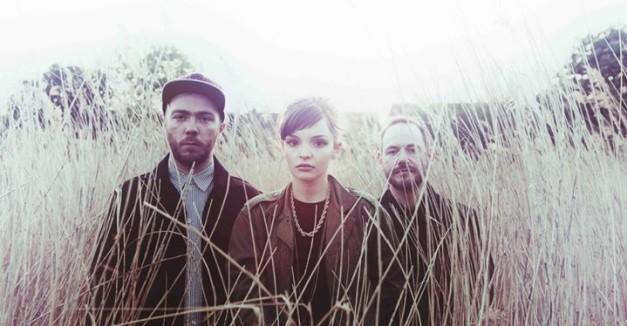CHVRCHES
Tickets: $20, available 6/13 at 10:00am
In little more than twelve months CHVRCHES have come out of nowhere to be everywhere. There’s a lot to catch up on since they posted their first song, Lies, online last May – a place in the top five of the BBC Sound of 2013, sell out headline tours in the UK and US (the most recent US tour playing to almost 20,000 people over 18 shows), a triumphant, award-winning appearance at SXSWand a string of stadium dates with Depeche Mode, to name but a few.
The excitement around that debut track was enhanced by the fact that there wasn’t so much as a photo of the band online. Who was that facelessly contorting the legacy of electronic music into surprisingly palatable new shapes? Lauren Mayberry, Iain Cook and Martin Doherty weren’t being deliberately coy – they were just hard at work capturing a sound that, in the tradition of all great musical alchemies, even surprised the band that made it.
Lies was followed in the summer by The Mother We Share – a euphoric, expertly-crafted piece of synthpop with a warm emotional centre that captured the imagination of a million listeners and saw the band step out from the shadows to put faces to the names. Both tracks, alongside bona fide singles Recover and Gun, feature on CHVRCHES’ longed-for debut album, The Bones of What You Believe, out now.
The album was produced by the band and recorded in Cook’s Alucard Studio in Glasgow, before being mixed by Rich Costey (Nine Inch Nails, Rage Against The Machine, Arctic Monkeys, Sigur Ros). “To me this is an indie rock band,” says Doherty. “Guitars are just replaced with keyboards – we want it rough.” The band’s peculiar magic lies in their juxtaposition of joy and doubt – these are robust, colourful pop songs whose lyrics reveal doubt and humanity, enhanced by the purity of Mayberry’s voice.
Cook and Doherty watched the world of electronics develop from behind more traditional instruments. Cook, who also composes for TV and film, played with the Scottish alt-rock group Aereogramme and was one half of its later incarnation The Unwinding Hours, whilst Doherty played keyboards for The Twilight Sad. Neither made music that sounded quite like this, until Mayberry – then working as a music journalist while singing with Glaswegian post-rock collective Blue Sky Archives, with whom Cook had previously recorded – turned up to help with a demo.
“I was late, I didn’t know the way, it was Sunday buses, it wasn’t a good start!” she recalls – “And this is going to sound weird,” Doherty cuts in, “but within thirty seconds of hearing her singing with us I knew this was something special. The range, the tone, the way the voice worked over the synths – it was immediate. I’d heard her voice before and liked it, but I wanted to take it out of its comfort zone. Now there’s a power to the vocal we never heard at first.”
During their recent headline tours Mayberry’s voice – a cut-glass, sci-fi soprano rounded off with warm Glaswegian tones – has developed into a formidable force. Onstage Cook and Doherty stand behind two banks of analogue synths, linked by a controller, allowing them to access one another’s machines and dovetail their bright explosions of sound. Their digital/analogue interface recalls their ‘80s heroes Prince and Depeche Mode but they work with the era-spanning musical know-how of Kieran Hebden and the celebratory spirit of LCD Soundsystem.
The twelve songs that make up The Bones of What You Believe are linked by their humanity but Mayberry’s lyrics are abstract and strangely inspirational. “With teeth we’ve come this far, I’ll take this thing by the throat and walk away,” she sings on By The Throat: everywhere, the imagery of flesh and blood, love and hope, rub up against Doherty and Cook’s aggressive synth fills and spluttering fanfares. On You Caught The Light, Doherty takes lead vocals and Cook’s guitar is reminiscent of Simple Minds or The Cure – an indie-rock yearning in an electronic world. Science and Visions (“a kind of sci-fi stalker story,” Mayberry laughs) sets her choirboy voice on a dark and ominous techno soundscape; on Lungs the sweetest melody gets an attack of crunchy bass and guitar. “That sweet and sour contrast is the key,” says Mayberry; adds Cook, “we pushed aggression in the production whenever there was sweetness in the vocal – we all gravitate towards that balance.”
Above all, the album is characterised by a combination of passion and restraint, Cook and Doherty often withholding their wizardry to let the melodies speak for themselves. That subtle balance is the sound of experience – three musicians who are endlessly excited by the sound they have discovered, but clearly in it for the long haul.






